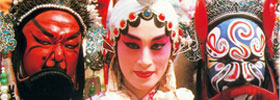Culture of Chinese Numbers
The Origin of Chinese Numbers
Numbers came into use about 5,000 years ago in China. From “1” to “10” to hundred, thousand, ten thousand, the number system was complete even in Shang Dynasty and the decimal system even started since that time.
Numbers are, in fact, originally coming from the early hunting practice. The ancients worship numbers as they do to the language, so numbers are always culturally connotative. People believe that some numbers can bring fortune and luck, and some may bring misfortune and even disaster to them. In China, the mystery of numbers has been much influenced by the concept of Yin and Yang. Ancients divide the ten numbers into two groups: the odd numbers are Yang, implying “the Heaven, the male”; while the even numbers are Yin, implying “the Earth, the female”.
Even Numbers and Odd Numbers
As a rule in day-to-day life in China, it is customary to regard even numbers as being more auspicious than odd numbers. In China, traditionally gifts are given as a part of the celebration for all occasions. Thus, guests will always give even-numbered presents. As the number two, usually suggests germination and harmony, at wedding celebrations, decorations are invariable set out in pair of red candles, a pair of pillows, and couplets hung on two side of the hall. Six, pronounced as “Liu”, conveys indirectly its homophonic meaning – Do everything smoothly; and eight in Chinese gas a similar sound to “Fa”, which means to make a fortune. All business men favor this numbers very much. However four, is the exception to the even number rule as it sounds like “Si” (death). So when people choose car license tags, phone numbers, and room numbers, they try to avoid it.
Chinese Number “One”
The Han People worship “yi” since ancient times. They hold the belief that all things on earth comes from “yi”, because “yi” has the similar meaning with “yuan”, “shi”, “chu”, meaning “the source”. The Taoist believes that “One makes two, two make three, and three make everything on earth.” “yi” sometimes means complete. For example, “all the things”, “yi” often goes together with other words expressing “quantity”, but means “whole or complete”. For example, “with mud all over the body”, “lead a poor life the whole lifetime”. Even when “yi” goes with “little”, “small” or other words expressing “small amount or little quantity”, “yi” again means “whole, complete”. For example, “not soiled by a speck of dust”, “not be the least negligent”, etc. according to the latest Chinese dictionary, the collocated expressions beginning with the word “yi” has a list of more than 640 entries.
Chinese Number “Ten”
Today, “ten” (“shi”) is often used to sum up the work of a year. For example, “Ten Best Singers of the Year”, “Ten Outstanding Young Persons of China”, "Ten Famous Inventive Entrepreneurs of China", “Ten Best National Sport Star of the Year”, “Ten Most Important National News in 2014”, and “Ten Most Important World News in 2014”, etc. When the People’s Republic of China was founded in 1949, there was a “10-year anniversary celebration” for the founding of the nation in 1959, which was “big and grand”. The Han People do things in that way because they like round number and round figure, which in their minds means “perfect and satisfaction”.












